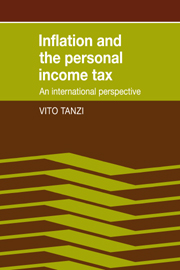Book contents
- Frontmatter
- Contents
- Preface
- 1 Inflation and personal income taxation: an introduction to the main issues
- 2 Inflation and the real progression of the rates: problems and solutions
- 3 Inflation and the real progression of the rates: countries' experiences
- 4 Inflation and the taxation of capital gains: problems and solutions
- 5 Inflation and the taxation of interest income: problems and solutions
- 6 Inflation and the taxation of business incomes
- 7 Inflation, lags in collection, and the real value of income tax revenue
- 8 Sensitivity of personal income tax yield to income changes: theory and measurement
- 9 Indexing the personal income tax for inflation and real growth
- 10 Inflation, income taxes, and the equilibrium rate of interest: theory
- 11 Inflation, income taxes, and interest rates: some empirical results
- 12 Inflation, indexation, and the wage-tax spiral
- 13 Some general conclusions on indexation
- Notes
- Index
7 - Inflation, lags in collection, and the real value of income tax revenue
Published online by Cambridge University Press: 07 October 2011
- Frontmatter
- Contents
- Preface
- 1 Inflation and personal income taxation: an introduction to the main issues
- 2 Inflation and the real progression of the rates: problems and solutions
- 3 Inflation and the real progression of the rates: countries' experiences
- 4 Inflation and the taxation of capital gains: problems and solutions
- 5 Inflation and the taxation of interest income: problems and solutions
- 6 Inflation and the taxation of business incomes
- 7 Inflation, lags in collection, and the real value of income tax revenue
- 8 Sensitivity of personal income tax yield to income changes: theory and measurement
- 9 Indexing the personal income tax for inflation and real growth
- 10 Inflation, income taxes, and the equilibrium rate of interest: theory
- 11 Inflation, income taxes, and interest rates: some empirical results
- 12 Inflation, indexation, and the wage-tax spiral
- 13 Some general conclusions on indexation
- Notes
- Index
Summary
The literature dealing with the impact of inflation on taxation has been biased by the recent experiences of the industrialized countries. For these countries, inflation has generally been associated with increases in the real value of income tax revenues, so that many authors have been led to believe that the main inflation-induced problems are the prevention of this supposedly unwanted, or at least unlegislated, increase in revenue and the neutralization of the inevitable effects on the redistribution of the tax burden among income groups. However, the increase in real revenue is likely to occur mainly when (1) the lags in the collection of income taxes are short, and (2) these taxes are elastic. However, while these characteristics seem to prevail in many industrialized countries, they are not common to all countries.
When one deals with countries with income taxes collected with somewhat longer lags and with elasticities not much greater, or even less, than unity, the consequences of inflation can be very different, especially when the rate of inflation becomes high. Unfortunately, these alternative situations are not products of an economist's imagination but, on the contrary, have either existed or continue to exist in many developing countries and perhaps even in some industrialized countries. For these countries, the problem has not been an increase, but rather an inflation-induced fall, in real income tax revenue. In many cases, this fall has itself become a contributing factor in the inflationary process when the affected governments have financed the fiscal deficits through the printing of new money.
- Type
- Chapter
- Information
- Inflation and the Personal Income TaxAn International Perspective, pp. 74 - 84Publisher: Cambridge University PressPrint publication year: 1980
- 4
- Cited by



